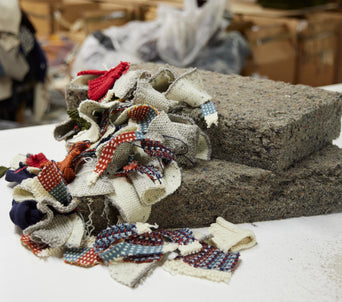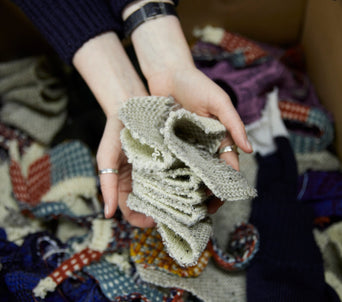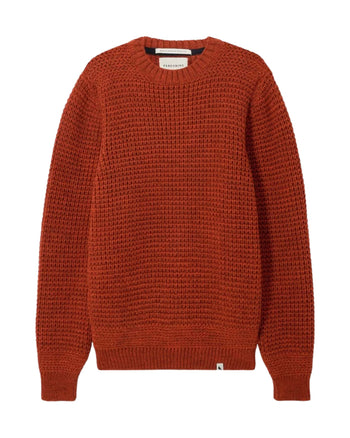- Home
- /
- Waste Wool
Waste Wool
How waste wool from our factory is being used as eco-friendly insulation.
Why are we recycling waste wool?
While we make every effort to minimise waste in our manufacturing process, there will always be some waste wool generated in our factories. Waste wool is often not in the right format to reknit with, so we looked to other industries for a solution. That’s when we discovered SISALWOOL™ insulation- a brand new eco-insulation for buildings created by Sisaltech Ltd.
Why is waste wool perfect for insulating buildings?
Wool is 100% renewable, 100% biodegradable and naturally flame retardant. This means wool products have the potential to be less environmentally damaging at the end of their lives.
What’s more, wool can hold up to 33% of its weight in moisture before feeling wet. This means that wool will condition the atmosphere surrounding it and allow the air to feel cool when it’s hot and warm when it’s not.

What exactly is SISALWOOL™ Insulation?
SISALWOOL™ insulation is a pioneering insulation product, using sisal fibre to give an excellent structure, and recycled natural fibres including wool to provide cosy insulation. Easy to work with and store, and free of any harmful properties, this winning combination is ideal for insulation.
Who’s behind the SISALWOOL™ project?
Sisaltech LTD is a natural fibre insulation manufacturer that specialises in sisal. The company was founded in 2012 by John Ferguson, who has a background in tropical agriculture. John spent several years working with small-scale farmers in East Africa. He strongly felt that sisal had the potential to be manufactured into a product and, in 2017, he turned his focus to insulation. SISALWOOL™ insulation is predicted to be classed as a climate-positive product.
Sisaltech LTD takes the yarn and cloth waste from our factory, applies an eco-friendly moth repellent, and converts it into fibre that can be reprocessed into wool-based wall insulation.

How is natural fibre insulation helping to combat climate change?
Insulation in general is vital to combating climate change, all the way from insulating hot water pipes in our homes to more industrial size projects. The more we insulate, the less energy we use and the less carbon is emitted.
Not only does the production of natural fibre insulation have less of an environmental impact than synthetic alternatives, natural insulation itself also comes with added benefits. It absorbs dangerous Volatile Organic Compounds (VOCs) like formaldehyde, allowing the house to breathe and keeping the air healthy.










